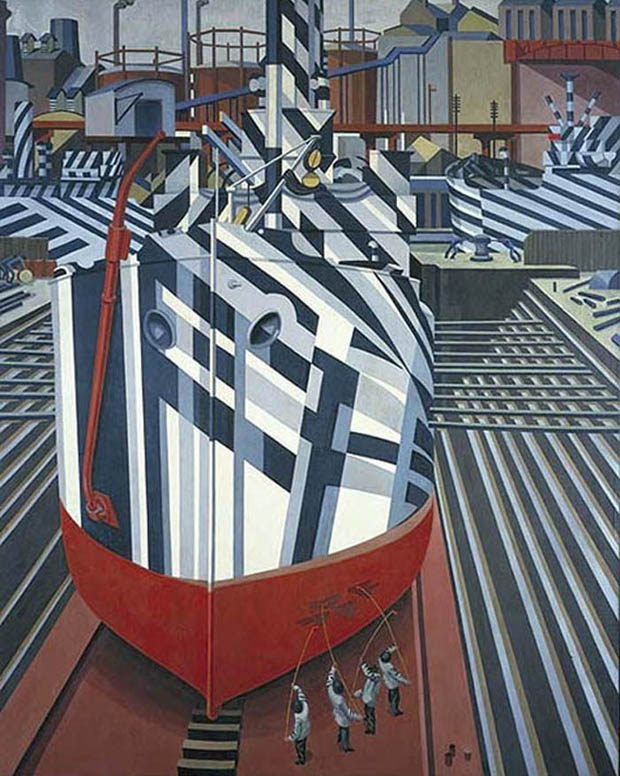While researching the previous post on Dazzle Ships I came across the artwork of UK native Kristian Goddard. He offers some additional insight into dazzle camouflage and shares all of his multi-media talents. Check his stuff out here

I've just finished the second in a series of dazzle camouflage canvases. The painting measures 60" x 40" and was created with acrylic paint on canvas. This composition is based on a detail of a dazzle ship photograph by Allie Wojtaszek. The colours derive from original dazzle ship drawings that illustrate this post. In a perfect world I would be happy to keep working on dazzle camouflage paintings for the rest of my life! I love the modernist nature of the patterns and the use of colour, which seems very much of its time. Painting is one of the best reminders we have that the past actually did exist in colour so it's fun to be able to work with a colour palette that existed nearly one hundred years ago. I seem to be getting more and more obsessed with dazzle ships and their history after working on these recent canvases and researching the subject. Dazzle ships are quite a romantic notion to me and the idea of beautifully coloured ships floating over the water in the dark is the sort of warm thought that puts me to sleep at night.

There are many ways that
pattern-based camouflage has been used, but none are as bizarre as the
British dazzle ship designs of World War I and, to a lesser degree,
World War II. These were abstract, clashing geometric decorative designs
that were applied to battleships in order to confuse viewers,
particularly German U-boats, using optical range finders. Although
dazzle paintwork is sometimes described as camouflage, it actually
wasn’t intended to hide anything in the way regular camouflage does.
Instead, it made it difficult to determine important aspects such as
shape, distance, speed, and direction.

The development of radar
in the 1940s made dazzle ship graphics less relevant, but it still crops
up here and there. In Austria, speed traps have been camouflaged with
dazzle to confuse drivers as to the direction the radar is pointing.
Many car prototypes also wear dazzle camouflage during testing to hide
the "curves" of the vehicle before the manufacturer is ready to show it
to the public. The USS North Carolina is still in dry dock in Willmington, where Blue Velvet was shot, so I hope to be able to take a day trip there soon!
Peter Saville famously used Edward Wadsworth's 1919 painting Dazzle Ships In Drydock At Liverpool (shown above) as the inspiration for the Orchestral Manoeuvres in the Dark Dazzle Ships
album cover. The original is in the National Gallery of Canada. Peter
Saville and Malcolm Garrett of Assorted iMaGes both made their careers
by brilliantly reinventing the past during the 80s, producing album
covers for Joy Division, New Order, Buzzcocks, Duran Duran, OMD, and
Peter Gabriel, amongst others. The original vinyl version of Dazzle Ships
uses Peter Saville's distinctive design on the gatefold cover and an
information graphic on the inner by Malcolm Garrett. The compact disc
re-release uses the same imagery with a completely different colour
scheme.
